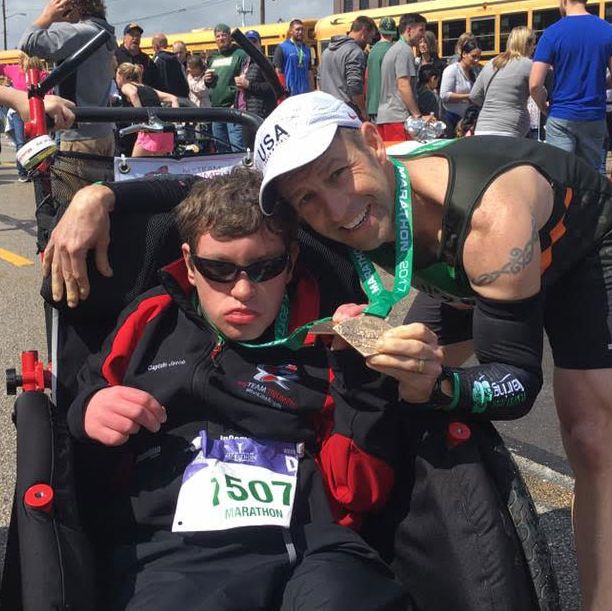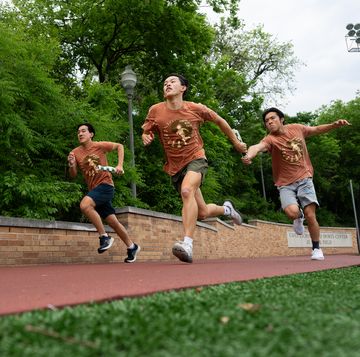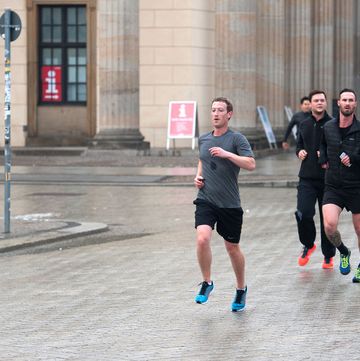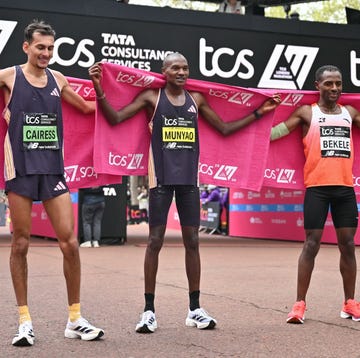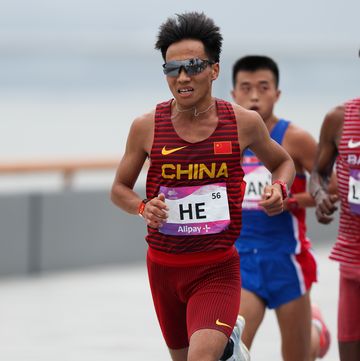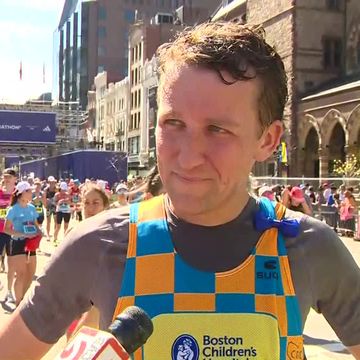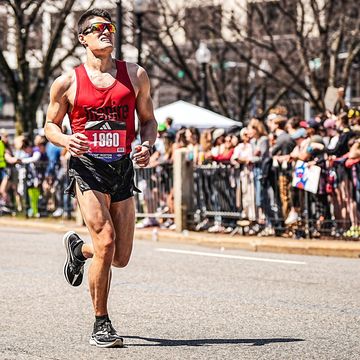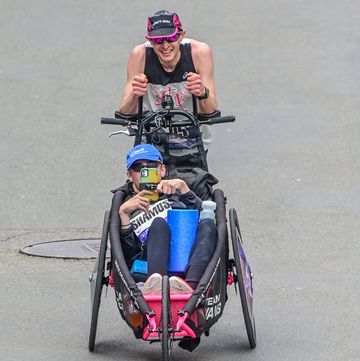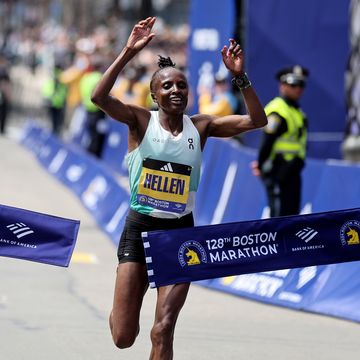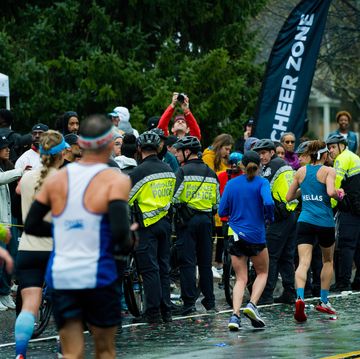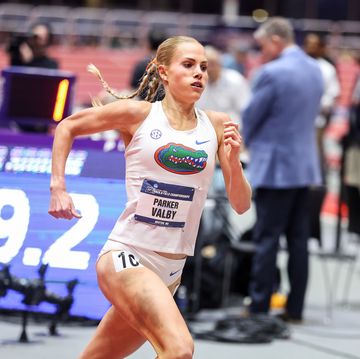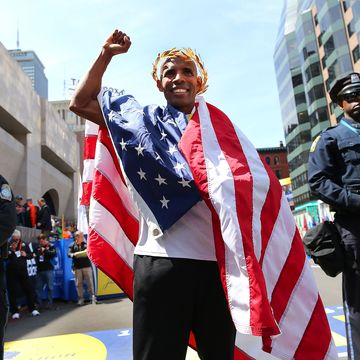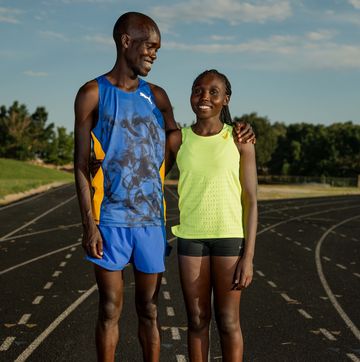Brian McWilliams and Jacob Vandenberg have raced together for about six years. Normally, McWilliams, 44, pushes Vandenberg, who’s 21 and has physical disabilities that limit his movements, in a special racing stroller during running events and triathlons.
But when the two crossed the finish line at Sunday’s Green Bay Marathon in a Boston Marathon qualifying time of 3:13:44, it was Vandenberg doing the pushing.
The two—teammates through an organization called myTEAM TRIUMPH, which pairs runners with challenges, known as “captains,” with runners called “angels”—switched places in the last tenth of a mile.
It’s a move they’d been practicing since Vandenberg first proposed it on a training run about six weeks ago. “Jacob is non-verbal,” McWilliams, who’s a triathlon coach and trainer in De Pere, Wisconsin, told Runner’s World. “But we just kind of understand each other.
“He pointed at himself, and then he did a pushing motion, and then he pointed to me. And I was like, ‘So you want to push me?’ He was like, ‘Yeah.’”
So they tried it twice on that run and at least once or twice on every other training run before the race.
When the day arrived, McWilliams didn’t know for sure if they could pull it off—he’d been battling some injuries and didn’t want to threaten their goal of qualifying for Boston. To do so, they had to meet McWilliams’s standard of 3:25:00. (He’ll be 45 by the day of the 2018 race, which affords him an extra 10 minutes.)
He’d shared the plan with Jacob’s mother, Debra Vandenberg of Green Bay, who also knew it wasn’t a guarantee. “You never know with Jacob. If he’s too cold he stiffens up,” she said. “But he’s kind of competitive. He likes when people are cheering them on.”
And cheer him they did—you can hear the crowd calling his name in the finish-line video. Thanks to his regular presence at area races and an article Friday in the Green Bay Press-Gazette, “everyone seems to know Jacob,” McWilliams said. “I heard his name a couple thousand times, and mine a few times, too.”
MORNING MOTIVATION: Get the Warmup in Your Inbox Each Weekday
Despite a quick pit stop for Vandenberg at mile 9, the crowd’s encouragement helped the duo run fast enough to stay well below the 7:49 pace they’d need to hit 3:25. By mile 24, McWilliams calculated that they could do the swap and still finish around 3:15.
So during the race’s final lap around Lambeau Field, McWilliams veered off to the side, helped Jacob Vandenberg out of the stroller, and hopped in.
Jacob has a distinctive laugh his mother describes as “kind of like Beavis and Butthead.” McWilliams heard it the entire way to the finish. “It was kind of a surreal moment—probably the most emotional I’ve ever had with Jacob,” he said. “I don’t know if you can truly put it into words.”
As for Debra, she and her husband, Jeff, had rushed back to watch the pair cross the line after seeing them at mile 22. “I’m cheering and crying and people are going, ‘Wow, it’s just a marathon,’” she said, choking back tears again at the memory. “But no, it’s not—it’s more than that.”
To her, the moment represented all the sacrifices McWilliams made in his own training and racing to achieve this elite goal with her son.
And, their achievement stands as a reminder that everyone, regardless of limitations, can reap the physical and psychological benefits of sports. “It doesn’t matter how they contribute—whether it’s their legs or their arms for swimming—but everybody can participate,” she said.
ALSO: For Many With Autism, Running Is a Sport That Fits
With the qualifying standard met, McWilliams will fill out an application for one of the slots reserved for such duos in the Boston Marathon and hope to hear back from race officials later this year.
“We’ll have to patiently wait and see,” Debra Vandenberg said. “But if we get in, we’re looking forward to the experience of being in such a historic race. We can’t wait to get out there and change the world, to let everybody know: You can do it.”

Cindy is a freelance health and fitness writer, author, and podcaster who’s contributed regularly to Runner’s World since 2013. She’s the coauthor of both Breakthrough Women’s Running: Dream Big and Train Smart and Rebound: Train Your Mind to Bounce Back Stronger from Sports Injuries, a book about the psychology of sports injury from Bloomsbury Sport. Cindy specializes in covering injury prevention and recovery, everyday athletes accomplishing extraordinary things, and the active community in her beloved Chicago, where winter forges deep bonds between those brave enough to train through it.
